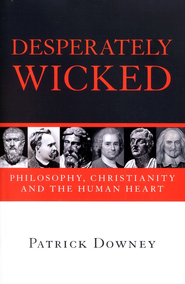Patrick Downey: Desperately Wicked
 Patrick Downey, Desperately Wicked: Philosophy, Christianity and the Human Heart (Downers Grove, IL: IVP Academic, 2009), 181 pages, ISBN 9780830828944.
Patrick Downey, Desperately Wicked: Philosophy, Christianity and the Human Heart (Downers Grove, IL: IVP Academic, 2009), 181 pages, ISBN 9780830828944.
Desperately Wicked is a philosophical exploration of who we are. As the subtitle suggests, Downey seeks to uncover the magnitude of the wickedness in the human heart. His analysis is sobering, exposing that what is wrong with us is more than merely the fragility of human fallibility.
After six chapters of exploring philosophical writings on sin, he concludes in chapters seven to nine by demonstrating the necessity of the coming of the Christ King. The solution to wickedness is the conversion of the human conscience, a transformation that only Christ can bring.
The book under review is also helpful for scholars since it is also probably written with the goal of complementing the resurgence of analytical philosophical theology. While Downey is not explicit about the connection with analytical philosophical theology, the motif is evident, both in this volume as in his other work, Serious Comedy: The Philosophical and Theological Significance of Tragic and Comic Writing in the Western Tradition.
Humanity, Downey postulates, wears a Dionysian mask that conceals the criminal intent to perform dark deeds aimed at satisfying our ‘wicked’ desires often invisible to others. Behind the concealments are fears and anxieties of wanting to appear just and be just, and people often seek to overcome fear through coercion. The erotic and thumotic desires relate to the intent of wanting to possess and keep our private property. To satisfy these erotic and thumotic desires, and to protect our possessions, we blame or deceive others, or exaggerate our superiority over others. These primordial desires in humankind are carried to full term in the social arena of politics exactly the way such was portrayed in the Greek tragedies.
Salvation is not possible by acquiring knowledge because we cannot undo who we are—desperately wicked.
We need the miracle of the King. He knows us. He possesses all of the virtues shared by none. And He offers a gift that overturns what is impossible to correct in humanity. He turned the body politic of survival and the invisible quest for erotic and thumotic desires so rooted in humanity, and makes us “Good.” No longer must we mistake who our enemies are. No longer must we treat our brothers and sisters as rivals. No longer must we hold with a tight fist our discontent and malaise but learn the spirit of loving, sharing, and accepting others. Friendship with God becomes then friendship with the world in service to God and the world, with justice and equality. The old bondage of fear, rooted in displaced desires, and manifested politically in the search for excellence and happiness by means of deception, cruelty and self-enrichment through impoverishing others has been replaced. The taboo of others reading through our “invisible” Dionysian mask of wickedness no longer has a hold of us!
Category: Biblical Studies, Spring 2011


